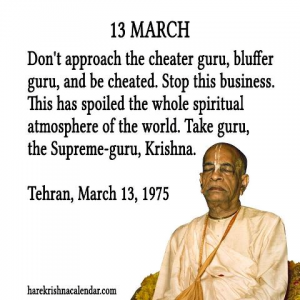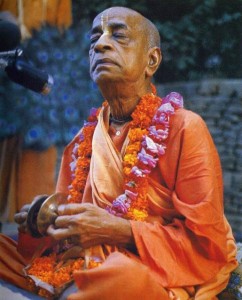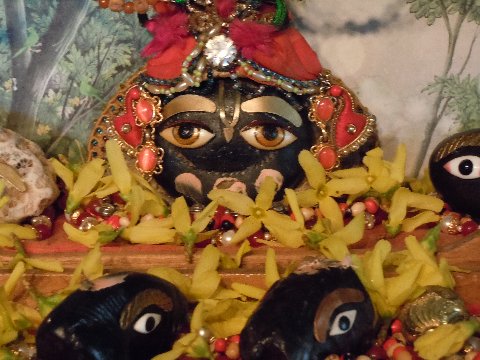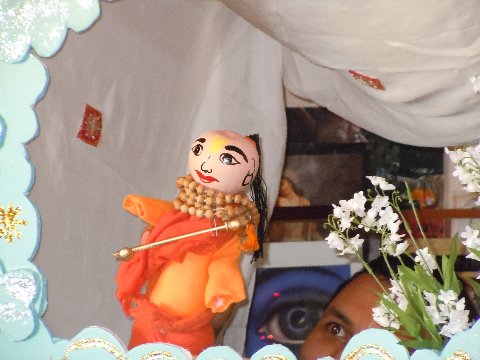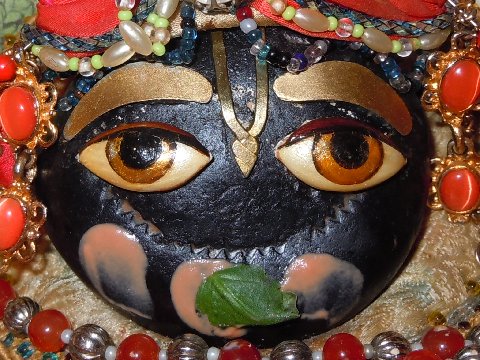Devotee (1): No, I know, but for his actions other than just following
the four regulative principles and chanting sixteen rounds. He does so
many other things during the day. Where does he derive his authority
if he’s not, let’s say, living in the temple?
Prabhupada: I do not follow. The authority is guru. You have accepted.
Bali Mardana: For everything.
Jayatirtha: Say I have some outside job, I’m living outside, but I’m
not giving 50% of my income. So then that work that I’m doing, is it
actually under the authority of the guru?
Prabhupada: Then you are not following the instruction of guru. That
is plain fact.
Jayatirtha: So that means that whole activity during the day, working,
that means I am not following the instruction of the guru. It’s
unauthorized activity.
Prabhupada: Yes. If you don’t follow the instruction of guru, then you
are fallen down immediately. That is the way. Otherwise why you sing,
yasya prasadad bhagavat-prasado. It is my duty to satisfy guru.
Otherwise I am nowhere. So if you prefer to be nowhere, then you
disobey as you like. But if you want to be steady in your position,
then you have to follow strictly the instruction of guru.
reading your books.
Prabhupada: Yes. Anyway, follow the instruction. That is required.
Jayatirtha: So the purpose of having the Society is to show the
devotees how they can always be twenty-four hours engaged according to
your instruction.
Prabhupada: Yes, that is helping one another. If I am deficient, by
seeing your example I shall correct myself. This is the idea, not that
a fool’s paradise: all fools and join together. Not like that.
whose sinful actions are completely eradicated and who are freed from
the duality of delusion, engage themselves in My service with
determination.
mentioned in this verse. For those who are sinful, atheistic, foolish
and deceitful, it is very difficult to transcend the duality of desire
and hate. Only those who have passed their lives in practicing the
regulative principles of religion, who have acted piously and who have
conquered sinful reactions can accept devotional service and gradually
rise to the pure knowledge of the Supreme Personality of Godhead.
Then, gradually, they can meditate in trance on the Supreme
Personality of Godhead. That is the process of being situated on the
spiritual platform.
and death take refuge in Me in devotional service. They are actually
Brahman because they entirely know everything about transcendental and
fruitive activities.
and what is inaction. Now I shall explain to you what action is
knowing which you shall be liberated from all sins.
service, and surrender fully to that consciousness. Those who want to
enjoy the fruits of their work are misers.
one should know properly what action is, what forbidden action is, and
what inaction is.
to understand the distinctions between action, inaction and
unauthorized actions. One has to apply oneself to such an analysis of
action, reaction and perverted actions because it is a very difficult
subject matter. To understand Krsna consciousness and action according
to the modes, one has to learn one’s relationship with the Supreme;
i.e., one who has learned perfectly knows that every living entity is
the eternal servitor of the Lord and that consequently one has to act
in Krsna consciousness. The entire Bhagavad-gita is directed toward
this conclusion. Any other conclusions, against this consciousness and
its attendant reactions, are vikarmas, or prohibited actions. To
understand all this one has to associate with authorities in Krsna
consciousness and learn the secret from them; this is as good as
learning from the Lord directly. Otherwise, even the most intelligent
with all the intricacies of this law of karma, or fruitive activities,
does not become affected by the results of his activities.
bonds of karma. His activities are all performed for Krsna; therefore
he does not enjoy or suffer any of the effects of work. …. Because
everything is done for Krsna, he enjoys only transcendental happiness
in the discharge of this service. Those who are engaged in this
process are known to be without desire for personal sense
gratification.
satisfied and independent, he performs no fruitive action, although
engaged in all kinds of undertakings.
consciousness when one is doing everything for Krsna.
complete knowledge, then to gain release from material miseries, and,
ultimately, to engage in loving transcendental service to the Supreme
Lord (Krsna consciousness). Nonetheless, there is a mystery about all
these different activities of sacrifice, and one should know this
mystery. Sacrifices sometimes take different forms according to the
particular faith of the performer. When one’s faith reaches the stage
of transcendental knowledge, the performer of sacrifices should be
considered more advanced than those who simply sacrifice material
possessions without such knowledge, for without attainment of
knowledge, sacrifices remain on the material platform and bestow no
spiritual benefit. Real knowledge culminates in Krsna consciousness,
the highest stage of transcendental knowledge. Without the elevation
of knowledge, sacrifices are simply material activities. When,
however, they are elevated to the level of transcendental knowledge,
all such activities enter onto the spiritual platform. Depending on
differences in consciousness, sacrificial activities are sometimes
called karma-kanda, fruitive activities, and sometimes jnana-kanda,
knowledge in the pursuit of truth. It is better when the end is
knowledge.
identity. As long as he does not know his real identity, he has to
work for fruitive results for sense gratification, and as long as one
is engrossed in the consciousness of sense gratification one has to
transmigrate from one body to another. Although the mind may be
engrossed in fruitive activities and influenced by ignorance, one must
develop a love for devotional service to Vasudeva. Only then can one
have the opportunity to get out of the bondage of material existence.”
Therefore, jnana (or knowledge that one is not this material body
but spirit soul) is not sufficient for liberation. One has to act in
the status of spirit soul, otherwise there is no escape from material
bondage.
work is so deep-rooted that it is very difficult even for the great
sages to control such desires, despite great endeavors. A devotee of
the Lord, constantly engaged in devotional service in Krsna
consciousness, perfect in self-realization, very quickly attains
liberation in the Supreme. Owing to his complete knowledge in
self-realization, he always remains in trance.
Prabhupada: Karma-yogi means one who does everything for Krsna. He’s
karma-yogi.
Guest (1): One who does everything for…?
Prabhupada: For Krsna.
Guest (1): For Krsna.
Prabhupada: Just like you are doing, doing some work. For whom you are
doing?
Guest (1): For my own benefit.
Prabhupada: That’s all. So that is karma. But when you do the same
thing for Krsna, that is karma-yoga.
for his own satisfaction. Just like Arjuna wanted to become
nonviolent: “No, no, Krsna. I cannot kill my kinsmen.” That is a good
proposal. But that was his satisfaction.
Guest (1): That is very correct.
Prabhupada: Yes. That was his satisfaction. But Krsna wanted that “You
must fight.” And when he agreed to that, that is his perfection.
Before that, he was trying to satisfy he.
… Whatever you do, that is your satisfaction. That is karma.
Guest (1): But not yogi.
Prabhupada: No, karma. (break) …for your own sense satisfaction,
that is karma. And if you do it for Krsna’s satisfaction, that is
karma-yoga.
same?
Prabhupada: Exactly the same.
Prabhupada: Pure bhakti is above karma-yoga. Pure bhakti is above
karma-yoga.
Bhagavata: That is the difference between the Chapter Karma-yoga and
Karma-yoga in Krsna Consciousness.
Prabhupada: Yes. Pure, pure devotion means Sravanam kirtanam.
Makhanlal: …you’re performing, is the vaidhi-bhakti stage of…
Prabhupada: Yes.
Makhanlal: …of the sadhana-bhakti, the regulative principles.
Prabhupada: Yes, vaidhi-bhakti means regulative principles, and when
you are accustomed, automatically you perform, that is raga-bhakti.
Makhanlal: So vaidhi-bhakti is considered superior to karma-yoga then.
Prabhupada: No. Karma-yoga is better.
Makhanlal: Karma-yoga is better?
Prabhupada: Yes.
Prabhupada: Pure bhakti is sravanam kirtanam. Sravanam kirtanam
visnu-smaranam pada-sevanam, that is pure bhakti. (break)
Yasomatinandana: …formed by anybody.
Prabhupada: Eh?
Yasomatinandana: Karma-yoga.
Prabhupada: Unless one is inclined to take to devotion, it is not
possible to take to karma-yoga. Who can sacrifice the profit?
Yasomatinandana: Does karma-yoga mean to follow exactly the sastras?
Prabhupada: Karma-yoga means yat karosi yaj juhosi kurusva tat
mad-arpanam.
Yasomatinandana: Doing only for Krsna.
Prabhupada: Yes. That is karma-yoga.
Devotee: Which means?
Prabhupada: “Whatever you do, the result give Me.”
Devotee: To Krsna.
Prabhupada: Yes.
Yasomatinandana: So we are also, those who are on the vaidhi-bhakti
(indistinct) on karma-yoga path because we are…
Prabhupada: Yes. They are acting under the order of the spiritual
Bhagavata: So when one follows the nine activities of devotion purely,
that is pure bhakti.
Prabhupada: Yes.
Bhagavata: Then when he’s following those nine activities, then he’s
superior.
Prabhupada: Eh?
Bhagavata: Then that’s superior to karma-yoga, to follow those nine
principles purely.
Prabhupada: Yes.
Makhanlal: Raganuga-bhakti is also superior to karma-yoga then?
Prabhupada: Bhakti is perfect stage. That is not for ordinary man.
Yasomatinandana: What is the difference between karma-yoga and… or
bhakti because they also (indistinct) Krsna?
Prabhupada: Now go on doing your duty, you’ll understand (indistinct).
Don’t try to understand in one day.
Bhagavata: It will be revealed to us as we act.
Prabhupada: Yes, the more you become in service attitude, things will
be revealed to you. (Sanskrit) prakasante. Becomes, it becomes
manifest. Sevonmukhe hi jihvadau sam eva sphuraty adhah. (break)
Prabhupada: No. Karma-yoga is better.
Makhanlal: Karma-yoga is better?
Prabhupada: Yes.
Now, in summarizing Bhagavad-gita, the Lord says that Arjuna should give up
all the processes that have been explained to him; he should simply
surrender to Krsna. That surrender will save him from all kinds of
sinful reactions, for the Lord personally promises to protect him.
In the ▼Seventh Chapter it was said that only one who has become
free from all sinful reactions can take to the worship of Lord Krsna.
Thus one may think that unless he is free from all sinful reactions he
cannot take to the surrendering process. To such doubts it is here
said that even if one is not free from all sinful reactions, simply by
the process of surrendering to Sri Krsna he is automatically freed.
There is no need of strenuous effort to free oneself from sinful
reactions. One should unhesitatingly accept Krsna as the supreme
savior of all living entities. With faith and love, one should
surrender unto Him.
association, who understands the eternal, who is done with material
lust and is freed from the duality of happiness and distress, and who
knows how to surrender unto the Supreme Person, attains to that
eternal kingdom.
qualification is that one should not be deluded by pride. Because the
conditioned soul is puffed up, thinking himself the lord of material
nature, it is very difficult for him to surrender unto the Supreme
Personality of Godhead. One should know by the cultivation of real
knowledge that he is not lord of material nature; the Supreme
Personality of Godhead is the Lord. When one is free from delusion
caused by pride, he can begin the process of surrender. For one who is
always expecting some honor in this material world, it is not possible
to surrender to the Supreme Person. Pride is due to illusion, for
although one comes here, stays for a brief time and then goes away, he
has the foolish notion that he is the lord of the world. He thus makes
moves under this impression. People are considering that the land,
this earth, belongs to human society, and they have divided the land
under the false impression that they are the proprietors. One has to
get out of this false notion that human society is the proprietor of
this world. When one is freed from such a false notion, he becomes
free from all the false associations caused by familial, social and
national affections. These faulty associations bind one to this
material world. After this stage, one has to develop spiritual
knowledge. One has to cultivate knowledge of what is actually his own
and what is actually not his own. And, when one has an understanding
of things as they are, he becomes free from all dual conceptions such
as happiness and distress, pleasure and pain. He becomes full in
knowledge; then it is possible for him to surrender to the Supreme
Personality of Godhead.
The injunction is that tad viddhi, if you want to understand
transcendental subject matter, not material, spiritual… Spiritual is
completely unknown to us because we do not know what is spiritual. We
are identifying with this body. You do not know even that “I am spirit
soul.” So where is the possibility of spiritual understanding? One
cannot see himself, what he is. He is thinking, “I am this body,”
exactly like the dog. The dog is thinking, “I am dog.” So if I think,
“I am American,” “I am Indian,” where is the difference? There is no
difference. Yasyatma-buddhih kunape tri-dhatuke. If one thinks that “I
am this body,” then he’s no better than sa eva go-kharah. The animals,
they also think like that, “I am this body.”
learn. Tad viddhi. How to learn? Where to learn? Pranipatena, fully
surrendered. If you find somebody that he is somebody important where
you can surrender fully, from him… Tad viddhi pranipata… This is.
Our process of Vedic knowledge is how to surrender, not that I hear
and I reject it. That is not the way. That is another rascaldom. First
of all find out the person where you can surrender.
Surrender means you first of all be convinced that “Here is a
person who can give me actual knowledge.” Therefore before selecting
guru one has to convince himself that “The person whom I am going to
accept as guru, whether he actually can give me the knowledge?” That
is wanted. Therefore before making guru, the system is, for one year
the prospective disciple should hear from the person and then decide.
And similarly, the guru also see a person who is actually submissive
or not. That is Vaisnava injunction, Hari-bhakti-vilasa, not that to
make a guru as a fashion. No. Not do. Don’t keep a guru,
order-supplying guru. No. Just like if somebody keeps a dog and the
master orders him, “Do this,” and he does, fashion. No. It is not
fashion. You must approach guru who…, where you can surrender.
Otherwise don’t make guru. And the guru also should not accept such
pranipatena. The first necessity is that you surrender. So here you
have seen, Pariksit Maharaja, although the emperor of the world, he is
taking lesson from Sukadeva Gosvami. Sukadeva Gosvami is seated on the
throne and he is seated on the ground, submissive. So does it mean
that “I shall become submissive, and whatever my guru will say, I will
have to accept?” No. Pariprasnena. Tad viddhi. Here is the pariprasna.
Sri-raja uvaca. Ask him. That is intelligent. Intelligently serve.
First of all we must… It is not that he is checking the guru, “How
my guru is learned?” No. The submission is there. But when the guru
says something, he may not understand. That concession is given,
pariprasna. You inquire.
identity. At the present moment we are not finding out our proper
identity. We are seeing to the body. I see you, your body, and you see
me, my body. We have no vision of the real person, which is, who is
occupying this body. This is the first lesson we get from
Bhagavad-gita: dehino ‘smin yatha dehe. Dehi… This body is called
deha, and the owner of the body is called dehi.
that is beginning of self-realization. That is called brahma-bhuta
stage. Aham brahmasmi: “I am not this material body.” Aham brahmasmi.
This is self-realization.



